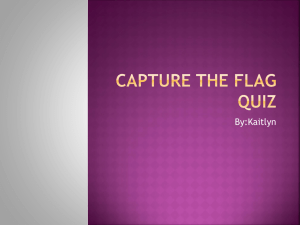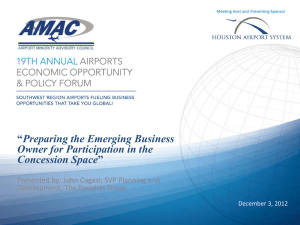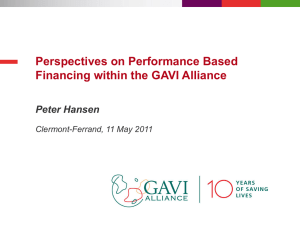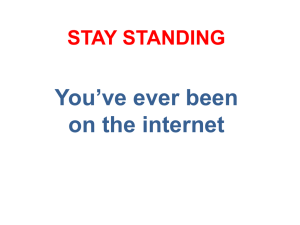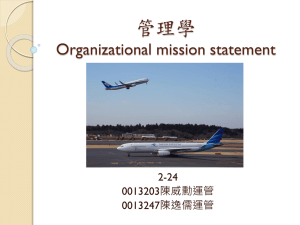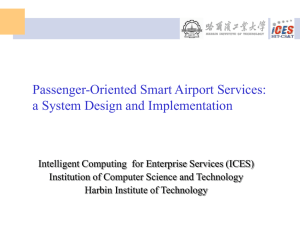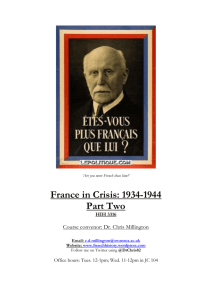L*université Blaise Pascal
advertisement
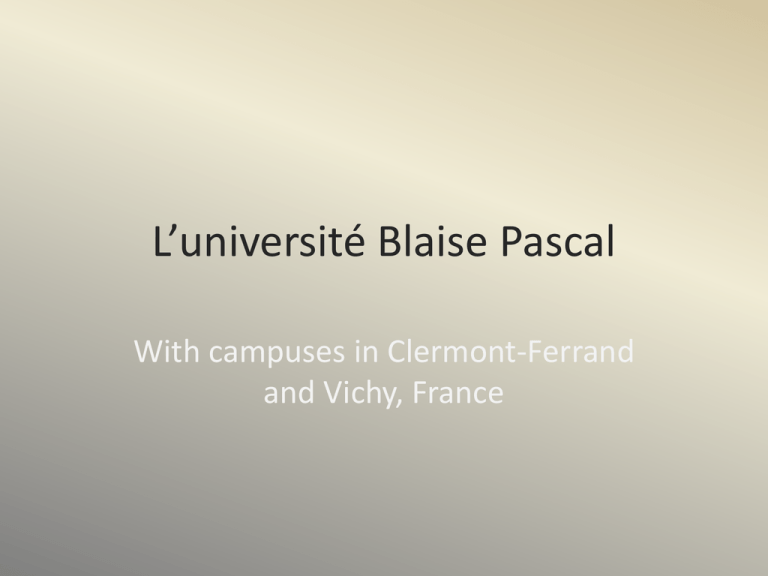
L’université Blaise Pascal With campuses in Clermont-Ferrand and Vichy, France Where is it? Vichy, France ClermontFerrand, France 250 miles/400km south of Paris 125mi/200km NW of Lyon 265mi/425km south of Paris 130mi/205km W of Lyon http://farm1.static.flickr.com/173/438144803_c3c4a84568.jpg?v=0 Language Learning in Clermont-Ferrand •Classes offered through the Service Universitaire des Etudiants Etrangers (SUEE) •Earn up to 18 credit hours of French language credit •Test into one of 6 levels of French classes, ensuring placement in a class with students who have similar language abilities •Learn French from native speakers who are experts at teaching their language •It is possible to take both SUEE and “regular” university classes at the same time. Choosing Courses: Clermont-Ferrand • University Courses: students may take regular classes offered by the university only if they can prove French proficiency. All university classes are taught in French. • SUEE (studying French as a foreign language): students test into one of six levels; levels 1-3 focus on basic French vocabulary, grammar, and French life and thought, while levels 4-6 focus on French culture, history, literature, writing, and speaking. http://www.tempe.gov/library/events/images/books.jpg Studying Business in Vichy • • • • • • Take business classes in English while also learning French Earn 15 hours of K-State credit Students take 3 of 6 offered business courses along with one French course per semester Students may choose between semester and year-long programs Increase familiarity with international business by learning from a French/European perspective Both semesters offer opportunities for creating research reports that can serve as the foundation for a final thesis or dissertation http://espace-economique-francophone.com/wp-content/uploads/2010/07/international_business.jpg Choosing Courses: Vichy Students choose 3 business courses and 1 French course per semester for a total of 15 credit hours. Which French course to enroll in is determined by the student’s proficiency in French. UBP Grading System Grading Scale: Grades range from 0-20, with 10 as the passing grade for each class. In some cases, grades below 10 can be equalized by other grades (if the student’s overall grade average is above 10) or by retaking the final exam. Academic Calendar Beginning of academic year: Late August Fall Break (one week): Last week of October End of first semester: Mid-December Inter-semester vacation: Mid-December to mid-January; exam re-takes take place the first two weeks of January Beginning of second semester: Mid-January Winter Break (one week): first or second week of March Spring Break (two weeks): last week of April and first week of May End of academic year: end of May or beginning of June; exam retakes take place at the end of June Check the UBP website for specific dates for each academic year Accommodation • Students may live in university housing, depending on availability, in both Clermont-Ferrand and Vichy – Lodging varies from approximately € 135-350 per month, depending on type of housing • Students are also free to search for their own lodging, such as a studio apartment or shared flat. – Host families may sometimes be available • Most students studying for two semesters can receive a housing benefit called the CAF, which provides a €90-130 per month stipend What Dorms Offer • Meal halls, where students can purchase lowpriced meals • Bathrooms and showers, sometimes en suite, sometimes shared by a floor or wing • Laundry facilities (Clermont-Ferrand only) • Acceuil (receptionist) services 24/7 Getting Your Visa • It can seem like a confusing process, so just take a deep breath and follow the steps once you sit down to do it! • Apply and be accepted to UBP • Create an account at www.usa.campusfrance.org and fill out all your passport, personal, and academic information. Don’t worry if you don’t have the answer to something, you can always save and come back later or submit it anyway and wait for them to call and explain if you did something wrong. – Campus France seems scarier than it is. Just accept it as your first taste of French red tape and know that, in most cases, things will work out. – Be sure to turn things in, including your payment, in a timely manner, because you cannot apply for your visa until you’re approved by Campus France (usually received by email) • Go to the consulate’s website to get the visa application and set up an appointment – You must go in person to a French consulate in the United States (Chicago is the nearest one to Manhattan) to turn in your application and all materials, including payment http://cms.mumbaimirror.com/portalfiles/3/62/200702/Image/french%20visa.jpg What to Bring • As few clothes as possible – people in France are all about rewearing and mixing and matching pieces, so bringing an American-sized wardrobe is completely unnecessary. • Bedding and towels – while you can rent them from the residence halls, it’s best to either bring or buy bedding/towels. If you buy them, talk with the acceuil to see if you can donate them when you leave if you don’t want to bother with selling things • An empty small duffel bag for weekend trips and for bringing home souvenirs and other purchases What to Bring • Plug adapter – depending on what appliances you bring from home, you may also need a power converter, but at the very least you’ll need something to allow your American computer charger to fit into your French outlets. • DVDs – like outlets, DVDs are in different formats for Europe than North America, so buying and playing DVDs on an American computer is sometimes not possible. So, if you want to watch something, make sure you bring it with you. • A journal or some sort of device for recording your time abroad What You should Buy There • • • • • • Ethernet cord for in-room internet A small fan (climate control is often not a reality) An extra pillow (no need to bring pillows with you all across the world!) Re-useable shopping bags School supplies (have fun digging through the European-style papers!) Toiletries and any hair dryers or straighteners you want (consider splitting a straightener with a friend instead of buying a nice one yourself) What Not to Bring • Large bottles of toiletries – They make your suitcase heavier, which costs money, and you can always buy them in France • Don’t think leaving them is a waste of money; they’ll still be ready and useable when you get back to the United States • Instead, pack travel-sized bottles to keep you clean until you buy more • Contraband – Always check the TSA website before flying to make sure you aren’t bringing anything you shouldn’t into the country • For example, some countries have strict restrictions about what foods you can bring • France is usually fairly lenient, but double check the customs restrictions before leaving to be sure • Most American electronics – The power levels are different in the U.S. than Europe, so most of them won’t work without a power adapter, and even that can be iffy • Things like phones, blow dryers, straighteners, electric toothbrushes, etc, all exist in Europe and can be purchased there if you discover that life simply is too inconvenient without them • Most computers have power adapters built into their power cords (it’s the box connected to the cord) and are therefore ready to go to Europe, as long as you have a plug (not power) adapter Getting to Clermont-Ferrand Airport: Clermont-Ferrand Airport, Auvergne (CFE) Train: Clermont-Ferrand Gare Things to consider when travelling: -check for flights to a larger airport in France (Paris, Marseille), then take a train to Clermont-Ferrand. -check sites like studentuniverse.com and statravel.com for student fares for discounted flights Getting to Vichy Airport: Clermont-Ferrand Airport, Auvergne (CFE) Train: Vichy Gare NOTE: you must take a train to get to Vichy. Both taxi and shuttle services are available between CFE and the Clermont-Ferrand train station, or you may take a train from a different airport directly to Vichy. Things to consider when travelling: -check for flights to a larger airport in France (Paris, Marseille), then take a train to Clermont-Ferrand. -check sites like studentuniverse.com and statravel.com for student fares for discounted flights Navigating Charles de Gaulle Airport Terminals 1 and 3: two smaller terminals, connected to terminal 2 through CDGVAL RER/Bus station: second of the two RER stations connecting the airport to Paris; also houses the bus station CDGVAL: transportation system within the airport. Basically a metro between the terminals. Terminal 2: largest terminal; most trans-Atlantic flights will land and depart from this terminal TGV/RER station: one of two RER stations connecting the airport to Paris, is also where trains arrive and depart from the airport Charles de Gaulle is a large airport and can be confusing, so take your time, pay attention to signs for directions, and don’t be afraid to ask for help! http://www.exploringmonkey.com/wp-content/uploads/2008/01/cdg_map.jpg Opening a Bank Account • Opening a bank account is not strictly required, but it is highly encouraged. American debit and credit cards work in most larger cities and stores, but many businesses do not accept non-European payments, partly because their technology is different and American cards do not work • Must present a passport and proof of residence, as well as an initial deposit (minimum amount varies by bank and account type) • If you are not fluent in French, bring someone who is to translate during the session…it’s important to understand what you’re signing up for and any fees involved • It is a good idea to transfer funds into the new account and use it as your primary bank account to avoid issues with using American payment devices or fees for frequent foreign withdrawals • When opening the account, find out how to close it and keep that information safe so you can close the account at the end of your stay Traveling in France: Trains • 12/25 card (carte douze/vingt-cinq): gives discounts from 2550% on train travel in France and to some EU destinations. – Costs approximately 50€ – Available for people aged 12-25; valid for one year – Must present card on train with ticket when asked by conductor or else pay maximum fare for the trip. • TGV, TER, and idTGV – TGV: high speed trains. Usually more expensive but also much faster. Not always available for smaller towns – TER: “regular” trains. Provide travel to most towns throughout France. – idTGV: “low cost” fast trains. Provides lower fares for fast-train travelling, much like a low-budget airline. • Make reservations at: www.sncf.com Traveling in France: Air • Low cost airlines: RyanAir, Wizzair, Easy Jet – Low cost brings few to no amenities; don’t expect a free cookie on the flight! – Most airlines have strict luggage restrictions; be sure to follow them and be aware of consequences for going over the limit – Always bring passport and any other documents required for check-in – Try to print boarding passes in advance; there is often a fee for printing them at the airport • Things to keep in mind… – Be sure to arrange for transportation to and from the airport, whether by cab, train, metro, etc. in plenty of time to check in and be on time for the flight – Always check restrictions as far as liquids, etc. for luggage and be sure to pack accordingly Eating • France is known for its baguettes and croissants, and for good reason. There are patisseries on almost every corner; stop in for a quick bite on the way to class – Many patisseries start baking early in the morning, about the time that bars close and people are walking home. In Clermont, the one on the corner across the street from Subway and the copy story has a “secret door” in the back where you can order satisfying munchies at the end of a night out. • French cuisine is rich and varied; try new things whenever you get the chance, and, when possible, have a friend make their favorite dish for you to get a truly authentic experience. – Fun fact: In France, hold your knife in your right hand and your fork in your left throughout the entire meal, using the knife to scoop things onto the fork instead of setting it down and switching hands. Communication • Check to see if your cell phone is unlocked for international use…if it is, simply take it abroad and buy a new SIM card in France • If you don’t bring your own phone, go to either an Orange or Bouygues phone store and buy a phone and a pay-as-you go plan. – For most plans, it only costs to send, and not to receive, texts and calls. So, if someone needs to get a hold of you and you’re out of credit, they can still call you • Don’t overlook the benefits of programs like Skype, Gmail chat, and Yahoo chat. All three offer video chat options, which are great for talking to people back home – Skype also offers a subscription service, which you can use to call cell phones from your computer, or to receive phone calls on your computer, which is another handy way to be able to communicate internationally Contact Information Stephanie Lamaison ri@univ-bpclermont.fr Directrice des Relations Internationales Geoffrey Heels geoffrey.heels@univ-bpclermont.fr Director-IUP Commerce International Fluent English Speaker Béatrice Pauty beatrice.pauty@univ-bpclermont.fr Directrice formation initiale SUEE – SCLV English speaker; French preferred Brigitte Meilleroux Brigitte.MEILLEROUX@univbpclermont.fr Service des Relations Internationales English speaker; French preferred Laurence Gourievidis Laurence.GOURIEVIDIS@univbpclermont.fr Senior Lecturer in British History Study Abroad Co-ordinator (Dept of English Studies) Erasmus Institutional Co-ordinator (Humanities, Incoming Students) Fluent English speaker Catherine Morgan-Proux catherine.morgan-proux@univbpclermont.fr STAR Instructor Member of the Department of Tourism Native English speaker
